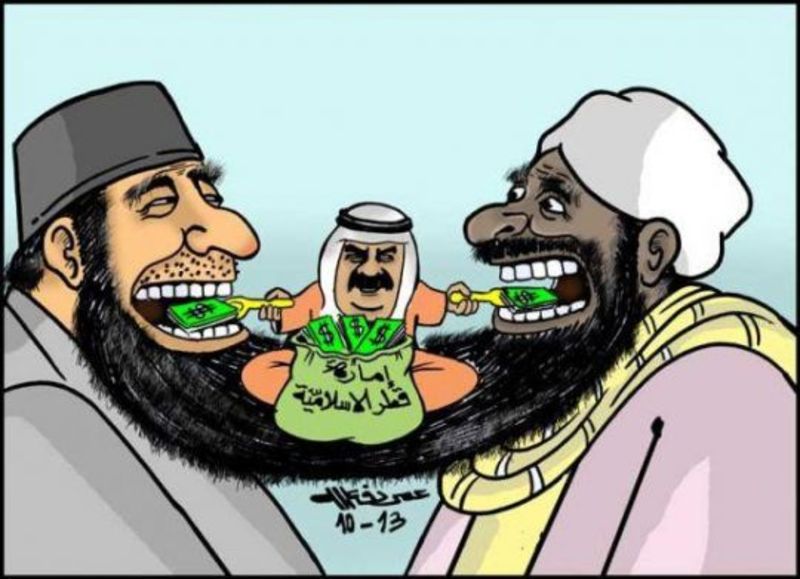Until very recently, nobody living in the small village of Cingoli, in the middle of the Appennine mountains of central Italy knew where Qatar was, or even what it is. But the local people learnt quickly enough when a delegation from the Gulf state, headed by ambassador Abdulaziz Bin Ahmed Al Malki, donated five million euros (Dh21.5 million) a couple of months ago to build a brand-new school in Macerata, the regional capital.
A year ago, the Marche region suffered a severe earthquake. There is still much rebuilding to be done. To struggling provincial communities like Cingoli the cash from Qatar was like gold raining down from the heavens.
Qatar has been most generous to Italy lately. In Sardinia, where Qatar bought the famous Costa Smeralda resort from American-Lebanese investor Tom Barrack, the country is committed to building a new hospital for the community of Olbia. Using funds from Qatari charity organisations, Doha is also financing the construction of several mosques across Italy.
In June, Peninsula Capital, a private equity fund managed by Spanish bankers and believed to be financed by Qatar, bought a majority stake in NTV, a privately-owned rail company which operates high-speed trains in Italy.
All this fresh activity and investment comes amid Qatar’s recent isolation by its neighbours over its support of extremist groups. The timing cannot be coincidental. Economic and political ties between Italy and Qatar date back to 2012 when the Qatari investment group Mayhoola acquired Valentino, the couture fashion house. Since then Qatar has kept on acquiring assets in Italy, especially hotels and leisure-related real estate.
Those ties were reinforced when Italy’s former prime minister Matteo Renzi made an informal visit to Doha at the beginning of this year. Mr Renzi is believed to have met the former emir, Sheikh Hamad bin Khalifa and his wife Sheikha Mozah and promoted business and investments deals. Now the mutual interests of Italy and Qatar have converged once more: Qatar needs to bypass its regional isolation by trying to build a direct relationship with one of the biggest economies in the European Union. For its part, Italy has been left considerably enfeebled by the recession of recent years.
Qatar’s seduction of one of the weaker economies in the EU serves them both. Italy supports Qatar in its to end its isolation, and benefits financially in the meantime. Only eight weeks ago, Doha announced a five billion euro (Dh21.5 billion) deal to buy five warships from Italy.
The donations to schools and hospitals are also a way to deflect any awkward questions about Qatar’s links to extremist groups.
The Italians do not seem much bothered by Qatar’s controversial image, which is surprising given the current mood in Europe following a series of terrorist attacks — in Barcelona, London, Manchester, Nice and Brussels just to name a few — inspired by extremist ideology. Neither the Italian media nor the public is asking questions about Qatar’s shopping spree.
The only people to voice any concern are Lega Nord, the nationalist anti-euro right-wing party, but even that is limited to the mosques that Qatar is helping to build.
“Following the Saudi and UAE decisions on Qatar, Italy should stop the construction and get transparency on the source of the money flow,” said Lega parliamentarian Paolo Grimoldi.
Repeated requests for comment on Qatar’s investments, made to government officials in Italy by The National have been met with silence.
“Petunia non olet” was a common saying in ancient Rome, which is Latin for “Money doesn’t stink.” Who cares where money comes from, as long as it comes, in quantity? The general attitude in the Italian parliament is that it only matters when money comes from an NGO linked to terrorist organisations Otherwise, Italy is not closed to any foreign investor.
A history of scandals, foreign invasions, the rise and fall of regimes, has taught the country to be cynical and opportunistic. This is reflected in its foreign policy too. Since the end of the Second World War, Italy has traditionally forged good relationships with Middle East “rogue nations”. In the 1980s, for instance, it was the only western country to maintain relations with Libya and after the 1979 revolution in Iran, Italy retained its ties with one of America’s greatest enemies.
Qatar is Italy’s latest rogue.








































admin in: How the Muslim Brotherhood betrayed Saudi Arabia?
Great article with insight ...
https://www.viagrapascherfr.com/achat-sildenafil-pfizer-tarif/ in: Cross-region cooperation between anti-terrorism agencies needed
Hello there, just became aware of your blog through Google, and found ...